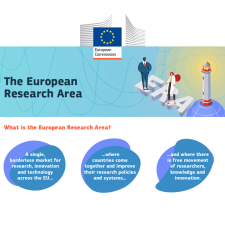
What can and can’t AI do? Is it ethical and safe to use chatbots for research tasks? What’s new in AI and where's it heading? Milica Ševkušić, EIFL Open Access Programme Project Coordinator, shares useful EIFL resources and training tools to help librarians to answer these questions and to train, support and guide researchers and library users.
Recent developments in generative artificial intelligence (AI) and the rise of widely available tools for content creation (chatbots, image, audio and video generators, code generators, etc.) have led to the emergence of new challenges for librarians and information specialists. Librarians provide training and guidance for students and faculty conducting research, who also come to the library with questions. For example, they want to know what generative AI can and cannot do, whether the university or journal allows the use of chatbots; if it’s safe to use chatbots for research tasks, and how to integrate AI into research practices. Librarians, who are usually not AI experts, find it difficult to keep up with new developments. The growing awareness that AI can impact library practices and workflows is accompanied with concerns that AI could overtake library jobs.
To help academic and research libraries in dealing with these challenges, EIFL has been including AI-related topics in training, and has developed useful presentations, guides and tools for librarians, trainers and researchers.
In 2024, discussion about the changing roles of academic and research libraries in the age of rapid AI development was taken up by participants in two events organized by EIFL’s library consortium partners: the 4th KLISC International Conference, 22–23 May 2024, organized by the Kenya Library and Information Services Consortium (KLISC), and the Botswana Libraries Consortium Meeting, 12 July 2024.
I was invited to give presentations, and for both events my presentation focused on the things librarians should know about artificial intelligence. The presentation addressed the key challenges for research libraries, the importance of AI literacy, and the role that libraries could play in shaping the responsible development and use of AI tools.
During questions and discussion time, participants raised concerns that the use of chatbots could increase the amount of plagiarism in student and research papers. Detecting the use of chatbots in student and research papers was another pressing issue – especially the reliability of available tools and the risk of wrongful accusations.
Participants also mentioned that the rise of generative AI was affecting the information seeking behaviour of students, who tended to abandon academic discovery services and search engines and seek answers from chatbots that are not suitable for these kinds of tasks.
Discussion highlighted the need for librarians to keep up with the latest developments in generative AI, and participants concluded that hands-on experience with specific AI tools, through testing and evaluation, could help them respond to users’ requests. It is also crucial that librarians integrate the latest recommendations and best practices regarding the ethical use of generative AI in research and scholarly writing in library workflows and training activities in order to improve AI literacy and informed use of AI tools.
New training programme outline
In response to requests from the Open Science trainers’ community, we compiled and have released the EIFL Artificial Intelligence and Open Science Training Programme Outline for librarians and open science trainers that can be used to develop training about the ethical and responsible use of AI. The draft was discussed and shared with the open science training community and their feedback has been included.
While focusing on the synergy of AI and open science, the training programme outline also provides general information to deepen understanding of the broader landscape of AI, paying special attention to research integrity. It is divided into six sections:
- Introduction to AI,
- Research and AI,
- Intersections of AI and Open Science,
- Boosting Knowledge Discovery with Open Science and AI,
- AI and Research Integrity, and
- Libraries and AI.
Each section gives an overview of the topic, what the trainer should cover, and what the learner should gain by the end of the training. Each topic includes ‘Resources for facilitators and learners’, with useful material that trainers and learners can use to improve their own knowledge, or if the licence allows, use in their training.
The training programme outline is conceived as a living resource that will be updated to capture new developments, tools and recommendations.
Join our webinars
You can also hear expert presentations at the EIFL webinar, ‘Libraries, copyright and AI for science and research', on 18 September 2024. The webinar will address issues such as the principles needed to underpin AI policy and regulation to support cutting edge science and research, as well as the copyright questions that concern libraries, text and data mining (TDM) and generative AI. And to learn about generative AI and Creative Commons licences, join the webinar ‘Libraries, Copyright and the Commons’ on 25 September 2024.
Get involved
To join the discussion on AI challenges and to suggest new resources for the training programme outline please contact us at oa@eifl.net.
SHARE / PRINT







